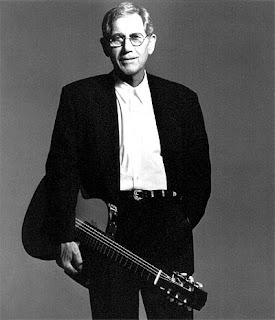... he died on June 30, 2001.
Chester Burton Atkins was born in Luttrell, Tennessee. In his 1974 autobiography, Country Gentleman, Chet wrote, "We were so poor and everybody around us was so poor that it was the forties before anyone even knew there had been a depression."
Before the guitar, he played a ukulele, later moving on to the fiddle. When he was nine, he traded an old pistol and some chores with his brother Lowell for a guitar. Atkins was a sensitive youth who made music his obsession. Because of his asthma, he was forced to sleep in a straight-back chair in order to breathe comfortably. On those nights, he would play his guitar until he fell asleep holding it, a habit which lasted his whole life.
Atkins became an accomplished guitarist while he was in high school. He used the restroom in the school to practice, because it gave better acoustics. His first guitar had a nail for a nut and was so bowed that only the first few frets could be used. He later purchased a semi-acoustic electric guitar and amp, but he had to travel many miles to find an electrical outlet since his home had no electricity.
(Continued below video and Amazon portals ...)
(Press album cover for direct link to the entire Amazon Website):

-----
Atkins did not have a strong style of his own until 1939 when he heard Merle Travis picking over WLW radio. This early influence dramatically shaped his unique playing style. Whereas Travis's right hand used his index finger for the melody and thumb for bass notes, Atkins expanded his right hand style to include picking with his first three fingers, with the thumb on bass.
After dropping out of high school in 1942, Atkins landed a job at WNOX-AM radio in Knoxville. There he played fiddle and guitar with singer Bill Carlisle and comic Archie Campbell as well as becoming a member of the station's Dixieland Swingsters, a small swing instrumental combo. After three years, he moved to WLW-AM in Cincinnati, Ohio, where Merle Travis formerly worked.
After six months he moved to Raleigh and worked with Johnnie and Jack before heading for Richmond, Virginia, where he performed with Sunshine Sue Workman. Atkins's shy personality worked against him, as did his musical style causing many to doubt he was truly "country." He was fired often but was soon able to land another job at another radio station due to his unique playing ability.
Traveling to Chicago, Atkins auditioned for Red Foley, who was leaving WLS-AM's National Barn Dance to join the Grand Ole Opry. Atkins made his first appearance at the Opry in 1946 as a member of Foley's band. He also performed ther with Maybelle & The Carter Sisters. He recorded "Guitar Blues," for Nashville-based Bullet Records that year.
Chet worked up to a solo spot on the Opry. When his spot was cut, Atkins moved on to KWTO-AM in Springfield, Missouri. however, he was fired for not sounding "country enough."
While working with a Western band in Denver, Colorado, Atkins drew the attention of RCA Victor. He made his first RCA recordings in Chicago in 1947. He also did some studio work for RCA that year but had relocated to Knoxville where he worked with Homer and Jethro on WNOX's new Saturday night radio show The Tennessee Barn Dance and the popular Midday Merry Go Round.
In 1949 he left WNOX to join Mother Maybelle and the Carter Sisters back on KWTO. This incarnation of the old Carter Family featured Maybelle Carter and daughters June, Helen and Anita. Their work soon attracted attention from the Grand Ole Opry. The group relocated to Nashville in mid-1950. Atkins began working on recording sessions, performing on WSM-AM and the Opry.
While he hadn't yet had a hit record on RCA his reputation grew. Atkins's first hit single was "Mr. Sandman," followed by "Silver Bell," a duet with Hank Snow. His albums also became more popular, and he was featured on ABC-TV's The Eddy Arnold Show during the summer of 1956; as well as on Country Music Jubilee in 1957 and 58.
In addition to recording, Atkins became a design consultant for Gretsch, who manufactured a popular Chet Atkins line of electric guitars from 1955–1980. Atkins also became manager of RCA's Nashville studio, eventually inspiring and seeing the completion of the legendary RCA Studio B, the first studio built specifically for the purpose of recording on the now-famous Music Row.
-----
Chet, along with Owen Bradley, are created the smoother country music style known as the Nashville sound, which expanded country's appeal to adult pop music fans as well.Atkins's picking style, inspired by Merle Travis, Django Reinhardt, George Barnes and Les Paul, brought him admirers within and outside the country scene, both in the United States and internationally. Atkins produced records for Perry Como, Elvis Presley, the Everly Brothers, Eddy Arnold, Don Gibson, Jim Reeves, Jerry Reed, Skeeter Davis, Connie Smith, Waylon Jennings and others.
Chet was diagnosed with cancer in the 1990s, but he continued to perform. He died on June 30, 2001 at his home in Nashville.
Atkins received numerous awards, including 14 Grammy Awards and in 1993, was awarded the Grammy Lifetime Achievement Award. He also won nine Country Music Association Instrumentalist of the Year awards. Billboard magazine awarded him their Century Award, their "highest honor for distinguished creative achievement" in December 1997.
He is a Country Music Hall of Fame and Museum inductee. In 2002, Atkins was posthumously inducted into the Rock and Roll Hall of Fame. The following year, Atkins ranked #28 in CMT's 40 Greatest Men of Country Music.
####




















